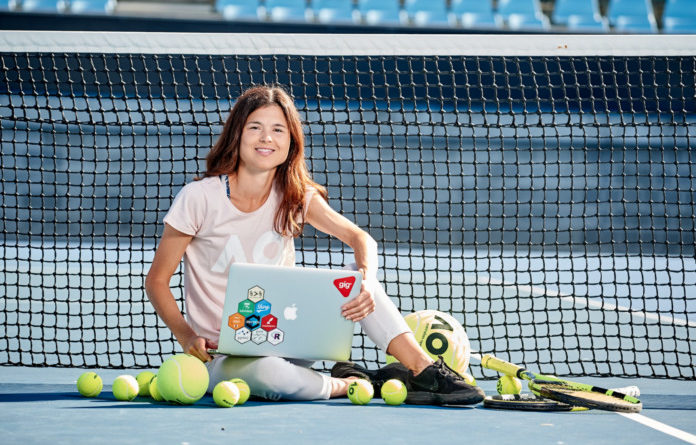STEM Jobs in Sport
STEM jobs in sport seriously hit it out of the park in terms of exciting career opportunities. And in the Australian Open? There’s a court full of experts serving up stats and tech behind the scenes.
By combining your passion for sport with science, tech, engineering or maths, you’re basically smashing your way to a dream job that’s also future proof. And who knows, you might even get to work with a pro Australian Open player one day!
1. Sports statistician
Love maths and tech? Double up on your STEM and consider becoming a sports statistician. These tech-savvy number crunchers gather real time info on sports performances and use their maths and computer skills to create formulas, programs and apps that turn stats into new data. Coaches and athletes then use this data to strategise about future games or competitions. Journalists and sports organisations find it handy too, and use it to report on matches and track progress and performance.
Meet a sports statistician: Senior data scientist for Tennis Australia, Dr Stephanie Kovalchik (above) uses maths processes like statistical modelling, Bayes’ Theorem (which shows how to update probabilities with new information), and machine learning to quantify things like how a player’s physicality might affect their performance.
2. Prosthetist
If you’re keen to dive into engineering, but equally stoked on health and helping others, a degree in prosthetics and orthotics could set you off on a compatible pathway.

The clinic-based training equips you with the qualifications to design, fit and manufacture a) artificial limbs for people with amputations and b) supportive devices for those with musculoskeletal weakness or neurological disorders. Career pathways include roles in hospitals, private prosthetic-orthotic facilities and independent agencies.
Meet a prosthetist: Prosthetist, orthotist and founder and director of Momentum Sports & Rehabilitation Services, Richard Goward, kickstarted his pathway into prosthetics after high school. He now spends nine to five creating protective guards for wheelchair rugby players, swimming splints for para-triathletes, and sport-specific arms for upper limb amputees.
3. Sports engineer
These STEM pros design and develop seriously cool tech for the sporting industry. They focus on the external factors that influence sporting performance, such as equipment and apparel, to help an athlete’s performance. Think lighter swimming costumes, slick wheelchairs and soccer balls that bounce a certain way. A sports engineer also creates tools for measuring and analysing performance.
Start your sports engineering journey: A Bachelor of Engineering (majoring in mechanical) could give you a huge head start.
4. Biomedical engineer

Biomedical and mechanical engineers apply their problem-solving skills to design and build devices and equipment used in healthcare and medicine. Teams of them work on slick, sophisticated hearing aids and implants to support hearing-impaired athletes!
Meet a biomedical engineer: Catherine Isaac graduated from UNSW with a Bachelors in Materials Science and a Masters in Biomedical Engineering. She works on the Cochlear Implant Project which has the potential to improve the hearing of thousands of people worldwide
5. Sports physical therapist
Let’s get physical! A sports physical therapist is involved in enhancing workout routines, attending to injuries and coming up with rehabilitation plans to get Australian Open pros competing at the top of their game. One of their main focuses is injury prevention, so they work to educate athletes on this too.
Where you’ll work: With sporting teams and organisations, as well as in private medical practices, hospitals, rehab clinics and outpatient offices.

6. Sports data analyst
If collecting on-field and off-field data on matches and athletes sounds like a fun gig to you, you should become a sports data analyst. This STEM job is all about looking at and interpreting deets to provide meaningful insights and info that could assist with performance, player health and gameplay. In this role, you also get to analyse fan behaviour, including what merch they buy and what they say on social media!
Meet a sports data analyst: When she’s not being a rowing champ, Cara Grzeskowiak works as a data analyst for the Australian Institue of Sport’s national Athlete Management System. Her current STEM role is about giving athletes useable data to improve performance standards.

7. Nutritionist
Australian Open players have pretty different nutritional needs, and that’s where a sports nutritionist or dietician comes in. They give expert advice and personalised meal plans that help sports stars fuel their bodies with all the good stuff they need to enhance their performance. A nutritionist or dietician can also work with an athlete on their general health and assist with fitness goals and injury prevention.
Start your sports nutrition journey: Sign yourself up for a Bachelor of Nutrition Science. STEM Jobs in Sport
8. Sports psychologist
Thinking about psych? Add in some sport and you could work with Australian Open players on strengthening their mental game. This includes preparing for competition or return from injury, as well as working on resilience and overcoming performance anxiety.
Where you’ll work: As a sports psychologist, you could work for a professional sports team, national governing bodies of sport (i.e. the Australian Institute of Sport) or for yourself as a consultant.
9. Sports scientist
A sport scientist uses biomechanics, psychology and biomechanics to improve an athlete’s performance and overall health. They do this through exercise and training programs that benefit the athlete or assist in recovery if they’ve been injured. They can work anywhere from sporting organisations and gyms, to health clinics and universities.
Meet a sports scientist: Tuguy Esgin is tackling noncommunicable diseases in Indigenous health through exercise and sports science, and is a lecturer at the University of Sydney. – Louise Meers and Cassie Steel
Author: Cassie Steel STEM Jobs in Sport
As Refraction’s digital editor, Cassie Steel spends her days researching robots and stalking famous scientists on Twitter.



